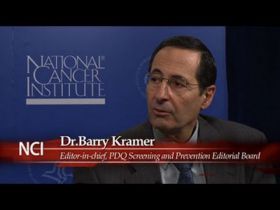Difference between revisions of "About-cancer/screening"
(Marked this version for translation) |
|||
| (7 intermediate revisions by 3 users not shown) | |||
| Line 1: | Line 1: | ||
| − | == Cancer Screening == | + | <languages/> |
| + | <translate> | ||
| + | == Cancer Screening == <!--T:1--> | ||
| − | Checking for cancer (or for abnormal cells that may become cancer) in people who have no symptoms is called screening. | + | <!--T:2--> |
| + | [[File:VczRKYCfOXoRzpk6hqWo2 M3zoFLHjCVRR0IzJ0IbNk.jpg|280px|right|Inside NCI: A Conversation with Dr. Barry Kramer about Cancer Screening.]] | ||
| + | Checking for cancer (or for abnormal cells that may become cancer) in people who have no symptoms is called screening. | ||
| + | <!--T:3--> | ||
Screening can help doctors find and treat several types of cancer early, before they cause symptoms. Early detection is important because when abnormal tissue or cancer is found early, it may be easier to treat. By the time symptoms appear, cancer may have begun to spread and be harder to treat. | Screening can help doctors find and treat several types of cancer early, before they cause symptoms. Early detection is important because when abnormal tissue or cancer is found early, it may be easier to treat. By the time symptoms appear, cancer may have begun to spread and be harder to treat. | ||
| + | <!--T:4--> | ||
Several screening tests have been shown to detect cancer early and to reduce the chance of dying from that cancer. These tests are described on the Screening Tests page. | Several screening tests have been shown to detect cancer early and to reduce the chance of dying from that cancer. These tests are described on the Screening Tests page. | ||
| + | <!--T:5--> | ||
But it is important to keep in mind that screening tests can have potential harms as well as benefits. | But it is important to keep in mind that screening tests can have potential harms as well as benefits. | ||
| + | <!--T:6--> | ||
*Some screening tests may cause bleeding or other health problems. | *Some screening tests may cause bleeding or other health problems. | ||
*Screening tests can have false-positive results—that is, the test indicates that cancer may be present even though it is not. False-positive test results can cause anxiety and are usually followed by additional tests and procedures that also have potential harms. | *Screening tests can have false-positive results—that is, the test indicates that cancer may be present even though it is not. False-positive test results can cause anxiety and are usually followed by additional tests and procedures that also have potential harms. | ||
| Line 14: | Line 22: | ||
*Screening can lead to overdiagnosis—that is, the screening test correctly shows that a person has cancer, but the cancer is slow growing and would not have harmed that person in his or her lifetime. Treatment of such cancers is called overtreatment. | *Screening can lead to overdiagnosis—that is, the screening test correctly shows that a person has cancer, but the cancer is slow growing and would not have harmed that person in his or her lifetime. Treatment of such cancers is called overtreatment. | ||
| + | <!--T:7--> | ||
It can be helpful for people to discuss the potential harms as well as benefits of different cancer screening tests with their doctors. | It can be helpful for people to discuss the potential harms as well as benefits of different cancer screening tests with their doctors. | ||
| + | </translate> | ||
Latest revision as of 21:13, 29 October 2019
Cancer Screening
Checking for cancer (or for abnormal cells that may become cancer) in people who have no symptoms is called screening.
Screening can help doctors find and treat several types of cancer early, before they cause symptoms. Early detection is important because when abnormal tissue or cancer is found early, it may be easier to treat. By the time symptoms appear, cancer may have begun to spread and be harder to treat.
Several screening tests have been shown to detect cancer early and to reduce the chance of dying from that cancer. These tests are described on the Screening Tests page.
But it is important to keep in mind that screening tests can have potential harms as well as benefits.
- Some screening tests may cause bleeding or other health problems.
- Screening tests can have false-positive results—that is, the test indicates that cancer may be present even though it is not. False-positive test results can cause anxiety and are usually followed by additional tests and procedures that also have potential harms.
- Screening tests can have false-negative results—that is, the test indicates that cancer is not present even though it is. False-negative test results may provide false reassurance, leading to delays in diagnosis and possibly causing an individual to put off seeking medical care even if symptoms develop.
- Screening can lead to overdiagnosis—that is, the screening test correctly shows that a person has cancer, but the cancer is slow growing and would not have harmed that person in his or her lifetime. Treatment of such cancers is called overtreatment.
It can be helpful for people to discuss the potential harms as well as benefits of different cancer screening tests with their doctors.
